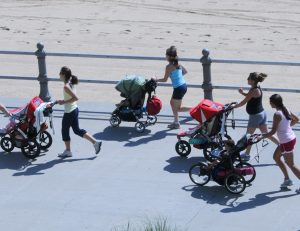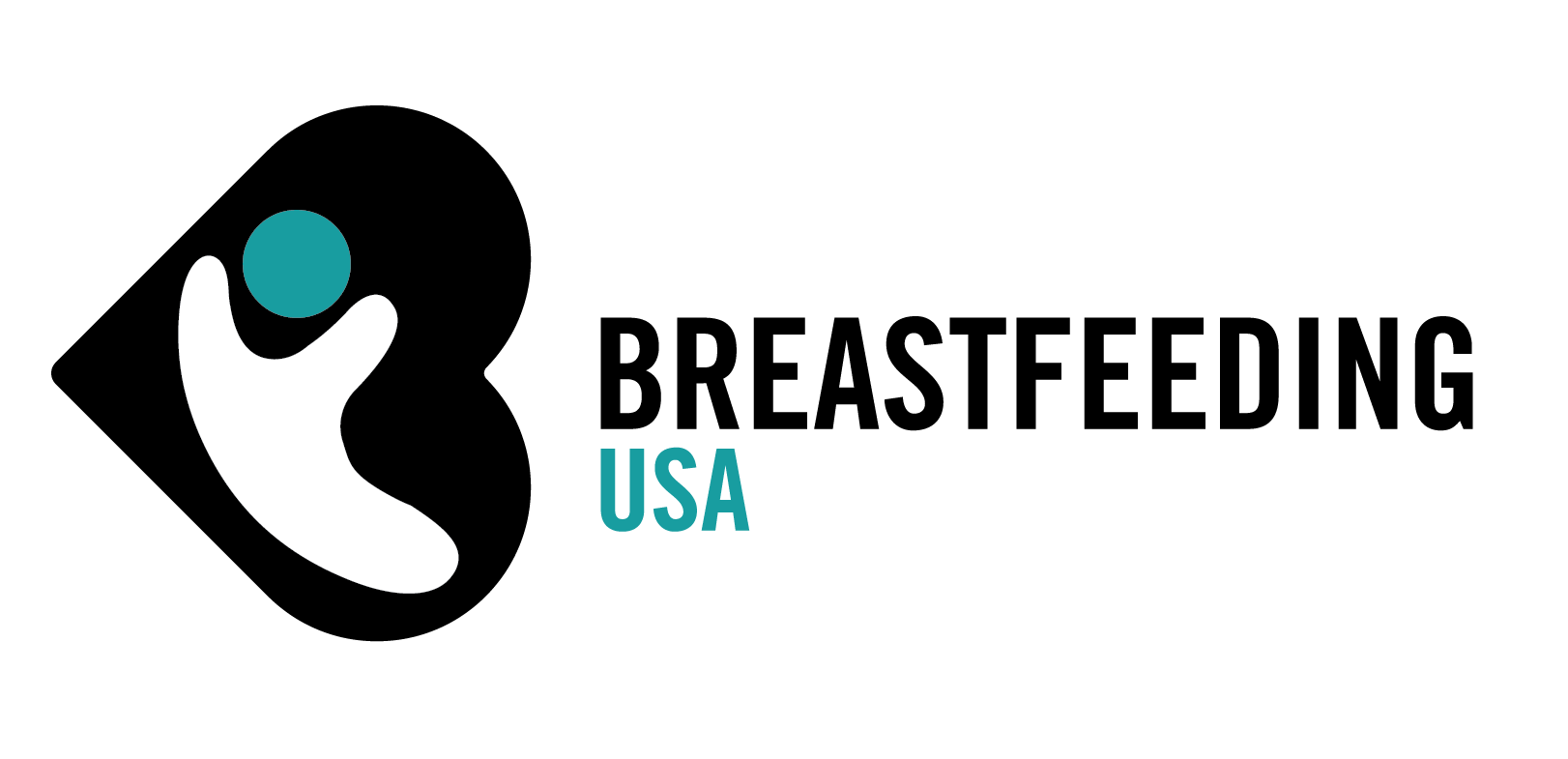By Jennifer Palmer and Sharon Knorr

For Aimee Teslaw, making time for cardio, Pilates, yoga, biking, dog walking, swimming, and playing outdoors with her children is important for a healthy lifestyle. So is breastfeeding. Aside from the occasional plugged duct, she says exercising hasn’t negatively impacted her milk supply. Teslaw, a Breastfeeding USA member in Barrington, IL, said she isn’t a lifelong athlete but began exercising in college and continues to work out both on her own and with her children. “I love exercising as much as I love breastfeeding!” she says. “It’s all part of my personal wellness plan.”
Research shows 1,2,3,4 that moderate exercise doesn’t affect milk supply, milk composition, or baby’s growth. Lactic acid levels have been shown to increase somewhat when a mother exercises to maximum intensity, described as exhaustive exercise, but there are no known harmful effects to the baby.5,6,7,8,9 A couple of small studies10,11 found no difference in immunologic factors after moderate exercise, but they showed a decrease in immune boosting proteins after exhaustive exercise. Levels return to normal within an hour, and the impact on baby is unlikely to be significant.
Most breastfeeding mothers naturally increase their calorie intake to adjust for those expended through exercise. While some moms anecdotally report difficulty consuming enough calories to compensate for increased exercise, an Australian study12 found no impact on infant growth. Researchers examined 587 mothers and found that for their babies age 6-12 months, exercise had not decreased breastfeeding duration. At a year, exercise had no significant impact on baby’s growth. The findings applied to both women exclusively breastfeeding and those who said they did “any” amount of breastfeeding.
Breastfeeding mothers would have to reach a high level of exercise and/or diet restriction to experience a drop-off in milk production. It depends, in part, on what the mother’s body was accustomed to before lactation. That’s why mothers who are calorie-restricted, such as in famine-stricken areas of the world, are still able to produce adequate milk, whereas the average mother in America might have problems if her calorie intake was suddenly decreased to that degree. Mothers are urged to start slowly in any new diet or exercise program, and work up to their goal over a period of time.
Mothers who are overweight or obese before or during pregnancy, may find that they actually do need a combination of exercise and calorie restriction in order to lose weight while breastfeeding. They need to start slowly and work up to a comfortable pattern of weight loss.
Exercising tips for breastfeeding mothers(from KellyMom):
For your own comfort, you may wish to nurse before exercising and wear a good, supportive bra. Some babies object to breastfeeding after mom has been sweating due to the salt on mom’s skin. You may wish to take a shower before nursing. If you regularly lift weights or do other exercise involving repetitive arm movement and you develop plugged ducts, cut back and start again more slowly. Keep yourself hydrated.
Some mothers share their stories:
I am breastfeeding my 24 month old and 5 month old. I started walking 30 minutes to an hour a day with my family or just the babies. About 2 months ago, I started going to an hour of Zumba a week to get some “me” time, and it does wonders! I am happier, refreshed, and have more energy for my kids. Before this, I never worked out, except for high school PE and sports, almost 20 years ago! I have not had a problem with my supply, but I make sure to keep up on my calorie intake and stay well hydrated.
Alissa Gomez-Dean
I do not “work out.” I juggle regularly, dance 45-60 minutes a day in my living room with my kids and walk pretty much every day between 3-5 miles going to and from places by bus. Parenting activities are nowhere near the level of activity that I sustained before kids. Between clowning, performing on touring shows, city living, and never eating “real” meals, I have put on weight just because of the amount of calories I consume to maintain my milk production for tandem breastfeeding. I have no idea how my activity level affects my milk production because I don’t really track feedings at this point. If I sit still long enough, some kid inevitably asks to nurse.
Christine Duenas
Staten Island NY Chapter
Around 6 months postpartum with my second child, I attempted to work out. I did a modified version of P90x. Within the first week, I dropped 9 lbs. and couldn’t ever feel satisfied after eating. I couldn’t keep up with the calories I needed, and my milk supply started waning. I never recovered the weight lost, and now, a year later, I am below my typical weight by 8 lbs. Prior to having children, I was an athlete in college and a very fit individual leading up to pregnancy. I have recently started working out again and am hungry constantly. My 21 month old has increased her nursing sessions from 2-3 per day to every few hours. I know this isn’t typical but for me, working out has a big impact on my body while breastfeeding. Even simple workouts like Pilates and yoga wear me down.
Sarah Harding
Note: When exercise (and thus calorie expenditure) is too overwhelming with very fast weight loss, the baby may be hungry and nurse more frequently to boost supply. While this is definitely not the norm, it does occasionally happen and shows that even experienced athletes may need to resume exercise more slowly or at a lower intensity after childbirth and during lactation. Our bodies and metabolism can change with the cycle of pregnancy, birth, and lactation. Going slowly, listening to your body, and watching your baby are the best ways to ease into a healthy program.
I (along with my friend and another Breastfeeding USA member) exercise 5-6 days a week. We run 10-15 miles/week and do strength training, kick boxing, etc. I haven’t had any supply problems at all.
Mandy Leonards
I am Mandy’s friend and haven’t noticed any major supply issues. My 17 month old still wakes 3+ times in the night to nurse and asks for breastmilk maybe 4-5 times throughout the day. I worked out while nursing with both of my babies, and I guess I notice a very, very slight decrease in production, but that is directly after a tough workout—I just feel empty (even though I know my breasts are never actually empty). The biggest thing I notice is it taking longer for my milk to let down, but since my baby is much older, I am not too concerned if she gets a couple of ounces less because she eats a ton of solids, as well. After a healthy snack and a big glass of water, I feel much less empty, and let down happens more quickly. Just my experience!
Megan Raymont
In conclusion, it seems from the research, and even from our own very small sampling of mothers’ stories, that for most moms, breastfeeding should not be seen as any kind of deterrent to a healthy exercise program. For each mother, the type and frequency of exercise may be different, but the fact is that our bodies are meant to be in motion. Healthy mothers – healthy babies. Go for it!
References
1. Daley AJ, Thomas A, Cooper H, et al. Maternal exercise and growth in breastfed infants: a meta-analysis of randomized controlled trials. Pediatrics 2012 Jul;130(1):108-14.
2. Dewey KG. Effects of maternal caloric restriction and exercise during lactation. J Nutr 1998 Feb;128:386S-389S.
3. Dewey KG, Lovelady CA, Nommsen-Rivers LA, McCrory MA, Lonnerdal B. A randomized study of the effects of aerobic exercise by lactating women on breast-milk volume and composition. N Engl J Med 1994 Feb 17;330:449-453.
4. Lovelady C. Balancing exercise and food intake with lactation to promote post-partum weight loss. Proc Nutr Soc. 2011 May;70(2):181-4. Epub 2011 Feb 24.
5. Quinn TJ, Carey GB. Does exercise intensity or diet influence lactic acid accumulation in breast milk? Med Sci Sports Exerc 1999 Jan;31(1):105-10.
6. Wallace JP, Ernsthausen GI. The influence of the fullness of milk in the breast on the concentration of lactic acid in postexercise breast milk. Int Jour of Sports Med 1992;13:395-398.
7. Wallace JP, Inbar G, Ernsthausen K. Infant acceptance of post-exercise breast milk. Pediatrics 1992 Jun;89(6 Pt 2):1245-7.
8. Wallace JP, Rabin J. The concentration of lactic acid in breast milk following maximal exercise. nt J Sports Med 1991 Jun;12:328-31.
9. Wright KS, Quinn TJ, Carey GB. Infant acceptance of breast milk after maternal exercise. Pediatrics. 2002 Apr;109(4):585-9.
10. Lovelady, CA, Hunter, CP, Geigerman, C. Effect of exercise on immunologic factors in breast milk. Pediatrics 2003;111;148-152.
11. R.L. Gregory, J.P. Wallace, L.E. Gfell, J. Marks, and B.A. King, Effects of exercise on milk immunoglobulin A. Med. Sci. Sports Exer 1997; 296–1601.
12. Dada Su, Yun Zhao, Colin Binns, Jane Scott and Wendy Oddy. Breastfeeding mothers can exercise: results of a cohort study. Public Health Nutrition,2007,10, pp 1089-1093.
Jennifer Palmer and Sharon Knorr
© Copyright Breastfeeding USA 2014. All rights are reserved.
